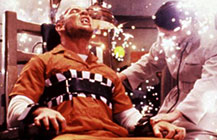|
|
|
|
Shocker
|
 |
|
Nothing divides filmgoers faster than a
horror movie. Purists profess to like only the old classics: films in poetic
black and white, presented by movie host Bill Collins on (Australian) TV,
featuring Dracula, the Wolfman, Jekyll & Hyde or Frankenstein. Many – particularly
those of faint heart – cannot begin to watch any kind of horror movie without
soon fleeing the theatre, or loungeroom.
Films
like The Thing (1982), The Fly (1986), A Nightmare on Elm St (1984), The Evil Dead (1982) and Hellraiser (1987) – and their vast brood of sequels – are extreme, excessive horror
movies: unrelenting, nasty and bloody (not to mention rather gooey).
Occasionally, you hear a public call to bury such films as quickly as possible,
even to ban them outright.
However,
approve of them or not, it cannot be denied that contemporary horror films are
extremely popular, especially in video stores. And there is a deeper, more
awful truth about these movies that some of our most concerned citizens will
probably never face. Simply, many of them are damn fine films – overflowing
with an artistry, intelligence and invention that is often sadly lacking from
more sedate, mainstream releases.
Which
brings us to Shocker and its
writer-director Wes Craven, the genius behind the Elm St series. No doubt it would be
easy for a high-minded reviewer to, on the one hand, parody this film for its
plot absurdities, paper-thin characterisations and video-arcade special effects
– while, on the other hand, decrying its morbid obsession with violence, death
and physical decay.
The
people who really love this film – and I don’t mean an oh-so-superior, camp
type of love – will approach it very differently. Its patent artificiality and
unreality help to make it a total fantasy – in fact, a bit like a fairy tale.
And in horror fairy tales (particularly those by Craven, a former Humanities
Professor), every aspect of our human experience is open to question and
speculation.
Shocker mixes
bits and pieces of many horror stories old and new. A slasher (or violent
serial killer) named Horace Pinker, played with grim relish by Mitch Pileggi,
is on the rampage; meanwhile, teenage Jonathan (Peter Berg) “sees” the crime
unwittingly in his dreams. Later, Jonathan loses his girlfriend, Alison (Camille
Cooper), to Pinker – and then she promptly reappears as a friendly ghost.
The
villain himself undergoes a more fantastic metamorphosis. Beseeching the
malevolent spirit inside his beloved TV set, Pinker is turned into pure electrical
energy, able to enter any human body (male or female, black or white), or
indeed any convenient power socket. This is a vivid instance of what I have
elswhere called the body hopper film,
the most famous example of which is The
Hidden (1987).
In
the incredible finale, Jonathan and Pinker plunge into a TV screen and do
battle in “video space” – passing through the highlights of world history as
constructed by TV news, fighting each other with a VCR remote control unit.
None of this makes
much sense – but that hardly matters. Shocker is, for all its downers – deaths and electrocutions galore – a strangely
giddy and liberating film. It prompts us to think in new and different ways
about our physical bodies, about the line between life and death, about the
mysterious energy waves that emanate from blinking TV sets and blaring radios.
The
film marks a fascinating cultural shift. Just 10 years ago, in Halloween (1978) or Dressed to Kill (1980), the slasher in films was a figure of
pure, almost inconceivable horror. Now, in Shocker and a whole slew of recent films, he (or she) becomes a figure of fun,
fantasy, and Heavy Metal energy – a good deal more interesting, in fact, than
the wimpy hero! Think of the murderous, ever-popular character of Freddy Krueger
from the Elm St films: he even got to
host his own TV series (Freddy’s
Nightmares [1988-1990]).
Of
course, Shocker is not really saying
that murder or death is fun; nor do I believe it will prompt young teens to
electrocute themselves in search of a big thrill. The film, ultimately, is
about the power of the imagination, and about those experiences that stir the
imagination into life – which includes everything from listening to Alice
Cooper albums to falling in love.
If Shocker does indeed touch on some pretty
weird and extreme fantasies, perhaps that is simply because it dares to be an
open, free-thinking film. I dare you to watch it.
© Adrian Martin February 1990 |
![]()